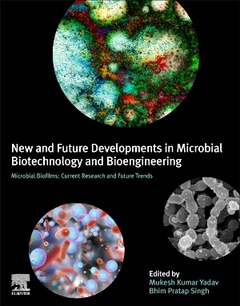Description
New and Future Developments in Microbial Biotechnology and Bioengineering: Microbial Biofilms
Current Research and Future Trends in Microbial Biofilms
Coordinators: Yadav Mukesh Kumar, Singh Bhim Pratap
Language: English
Subject for New and Future Developments in Microbial Biotechnology...:
324 p. · 21.4x27.6 cm · Paperback
Description
/li>Contents
/li>Readership
/li>Biography
/li>Comment
/li>
New and Future Developments in Microbial Biotechnology and Bioengineering: Microbial Biofilms is divided into three sections: microbial adhesion/biofilms in medical settings, microbial adhesion/biofilms in agriculture, and microbial adhesion/biofilm in the environment and industry. Chapters cover adhesion and biofilm formation by pathogenic microbes on tissue and on indwelling medical devices, including sections on human infections, microbial communication during biofilm mode of growth, host defense and antimicrobial resistance, and more. Other sections cover the biofilms of agriculturally important and environmental friendly microbes, including biofilm formation on plants, in soil, and in aquatic environments.
Finally, the latest scientific research on microbial adhesion and biofilm formation in the environment and in industry is covered.
1. Microbial biofilms and human disease: A concise review
2. Microbial biofilms on medical indwelling devices
3. Pseudomonas aeruginosa biofilms and infections: Roles of extracellular molecules
4. Microbial biofilms: Human mucosa and intestinal microbiota
5. Biofilms: Development and molecular interaction of microbiome in the human oral cavity
6. Antistaphylococcal activity of 2(5H)-furanone derivatives
7. Actinobacteria as a potential natural source to produce antibiofilm compounds: An overview
8. Control of microbial biofilms: Application of natural and synthetic compounds
9. Microbial biofilms involved in the filtration of odorous gas emissions from livestock farming
10. Microbial biofilms: Development, structure, and their social assemblage for beneficial applications
11. Biofilm: A microbial assemblage on the surface—A boon or bane?
12. Plant and soil-associated biofilmforming bacteria: Their role in green agriculture
13. Rhizobacteria and its biofilm for sustainable agriculture: A concise review
14. Biofilm-mediated bioremediation of pollutants from the environment for sustainable development
15. Microbial biofilm: An advanced eco-friendly approach for bioremediation
16. Agriculturally important microbial biofilms: Biodiversity, ecological, significances, and biotechnological applications
17. Potential application of bacterial biofilm for bioremediation of toxic heavy metals and dyecontaminated environments
18. Microbial biofilms: Functional annotation and potential applications in agriculture and allied sectors
Graduate, post- graduate, PhD students and researcher scholars working in the field of biotechnology and bio-engineering as well as industrial microbiology and soil microbiology researchers. Researcher and healthcare practitioners seeking better understanding of fungal and bacteria biofilms.
Dr. Yadav’s research group has identified biofilm related genes and their pathway in both bacteria and fungi. And have identified the potential anti-biofilm compounds (synthetic and natural), and also studied genomic, proteomics and mechanism of biofilm formation by single species and multi-species using in vitro and in vivo models. Dr Yadav has published more than 35 research articles on in peer re
- Provides an overview on the growth, structure, cell-to-cell interactions, and control/dispersal of bacterial and fungal of in vitro and in vivo biofilms
- Presents an overview on the microbial adhesion, biofilm formation and structures of single-species and multi-species biofilms on human tissues/medical devices, agriculture, environment and chemical industries
- Includes chapters on microbial biofilms of pathogenic microbes on human tissues and in medical indwelling devices
- Covers factors affecting microbial biofilm, adhesion and formation

